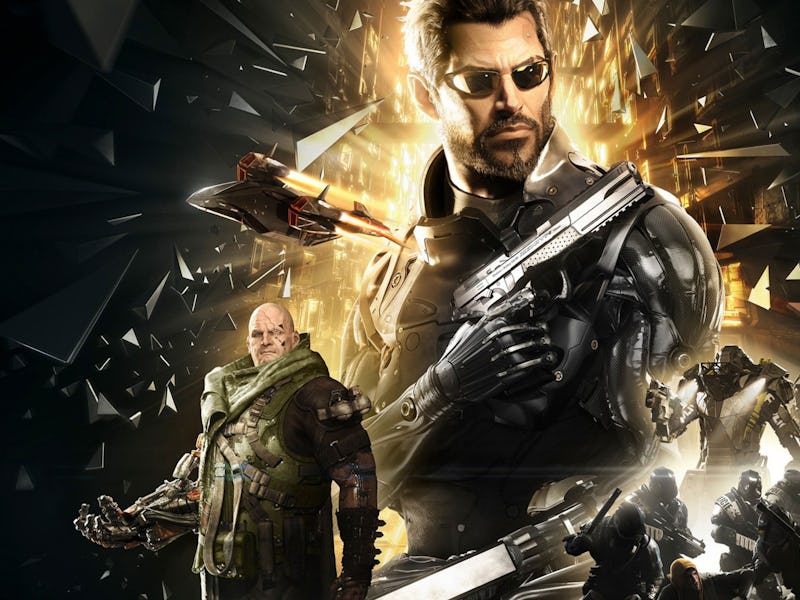Three reasons why the Square Enix deal is actually a good thing
Every cloud has a silver lining.

In yet another act of consolidation, Square Enix has agreed to sell its North American studios and a catalog of IPs to Embracer Group for $300 million, a measly price compared to many other recent acquisitions in the games industry.
Embracer will acquire Crystal Dynamics, Eidos Montreal, and Square Enix Montreal, along with IPs like Deus Ex, Tomb Raider, Thief, Legacy of Kain, and potentially Marvel titles like Avengers and Guardians of the Galaxy. This essentially eliminates Square Enix’s North American development efforts, and it’s surprising to see all of this go for such a low price. Just a few months ago, Sony spent $3.6 billion to purchase Bungie. While there are some obvious negatives outcomes to the deal, there are also some potentially huge positive factors.
Studios have a chance to shine
Marvel’s Guardians of the Galaxy is the latest in a long line of western-developed games seen as “sales disappointments” to Square Enix.
It’s been all too obvious for years now that Square Enix simply didn’t know how to manage its western studios. Top brass have made multiple comments about these studios producing disappointing sales, from Shadow of the Tomb Raider to Marvel’s Guardians of the Galaxy. Then you have the debacle of Marvel’s Avengers, a promising game that seems to have lacked a core vision.
In November 2021, Square Enix President Yosuke Matsuda even said Crystal Dynamics wasn’t the right developer for Avengers, which strangely felt like a CEO throwing its developer under the bus. Even past that there are other examples, like the rushed development and release of Deus Ex: Mankind Divided, which resulted in the franchise being put “on hold.”
All three developers are talented studios, and in the right hands, it’s exciting to think about what they could do. Eidos might have the chance to return to Deus Ex and finish the story it started, or produce the Guardians of the Galaxy sequel that initially seemed unlikely. Embracer Group has been rapidly expanding over the last few years, and the conglomerate now owns Gearbox Software, THQ Nordic, Asmodee, and more. Crystal Dynamics and Eidos Montreal joining that list means the studios could potentially have access to more resources and infrastructure moving forward.
At the same time, Embracer Group heavily investing in these three studios could help ensure the employees that work there keep their jobs. With Square Enix’s continued disappointment with this branch of its operations, it’s easy to imagine layoffs could have loomed in the future. Of course, this could potentially still lead to layoffs at Square Enix, as it tightens up departments that no longer have to support these sold studios, like marketing and QA.
There are a lot of “ifs” involved, but if Embracer can give these studios the support they need, we could see some truly impressive experiences in the future.
Dead sequels and franchises may get a second life
Square Enix has dozens of IPs it hasn’t touched in years, which Embracer Group could revive.
As part of the deal, Embracer Group will get the rights to a catalog of nearly 50 Square Enix IPs. While Square Enix often returns to its back catalog of Japanese games, the same simply cannot be said for the western ones. Multiple series have been left to languish in the past. Considering the comments made about new releases, Square Enix likely just wasn’t willing to take the chance on reviving old franchises, with the risk not meeting the potential reward.
With Embracer taking the reins of franchises like Legacy of Kain, Gex, Thief, and more, any number of studios could develop new takes on these franchises, not just Crystal Dynamics and Eidos.
We’ve already seen this happen. Square Enix withdrew from ownership of IO Interactive, with the now-independent studio retaining the rights to Hitman. Since then, IO Interactive has arguably become more successful than ever before, releasing Hitman 2 and 3 to rave reviews. While IO Interactive made all the right moves with self-publishing, Crystal Dynamics and Eidos could also see more success apart from Square Enix.
Square Enix can focus on what it does best
Square Enix is infamous for its lengthy development cycles.
There is an upside here for Square Enix as well — it won’t pump money into projects it doesn’t know how to handle. Of course, there’s no guarantee Square Enix is going to invest its new money well, as a press release from Square Enix says it “enables the launch of new businesses by moving forward with investments in fields including blockchain, AI, and the cloud.”
Still, now Square Enix can devote more resources to projects from its Japanese studios, which could have beneficial effects. Square Enix is renowned for announcing games too early, with projects stuck in development for years. Kingdom Hearts 3 took a whole six years from announcement to release, while Final Fantasy 7 Remake took five years. Hopefully, having a sole focus on Japanese development will allow Square Enix to streamline its processes. At the moment, the company has a ton of titles in production that we know very little about, including Dragon Quest XII, Final Fantasy 7 Remake Part 2, Kingdom Hearts 4, and Final Fantasy XVI.
Square Enix’s bread and butter are its core role-playing experiences. Hopefully, this deal will lead to the company doubling down on just that.